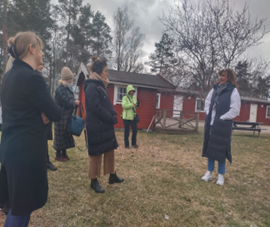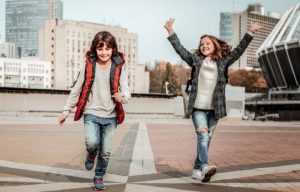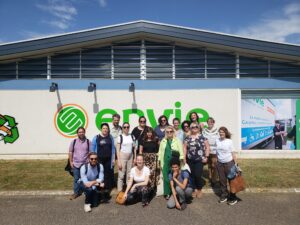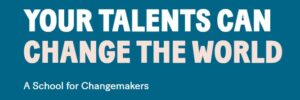The Learning expeditions in France and Sweden
Part 2: Swedish Learning Expedition
As part of WP3, last April and May, 2 Latvian and 8 Spanish pilot-projects travelled to Sweden and France to benefit from the experience of mature social innovation projects who’s project owners were able to share some good advice on how to scale up.
Benefiting from Swedish social innovation projects’ experience in upscaling
Inkludera and Reach for Change, the Swedish partners from BuiCaSuS, offered the possibility for the BuiCaSuS experiment’s participants to meet two mature social innovation projects in Stockholm. Focusing on exclusion prevention, social food stores and substance abuse rehabilitation, they were able to share their extensive experience on upscaling
Stockholms Stadsmission – www.stadsmissionen.se
In 2015 Stockholms Stadsmission created a food store, Matmissionen, that retrieves donated surplus food from the grocery industry, which would otherwise go to waste. Matmissionen then sells the food to people in need for about a third of the regular sales price. Besides selling food to its members, Matmissionen also delivers food to kitchens that prepare and serve it to, for instance, people experiencing homelessness.
Furthermore, as a part of Matmissionen’s concept, they provide work training for individuals who have been unemployed long-term to prepare them for a job in the labor market. The training includes tasks like customer service, managing the cash register, logistics, unloading and stocking the shelves.
In order to be able to purchase goods at a reduced price, membership is required – those without a membership also can shop at Matmissionen but then at regular prices. Membership is free and is determined based on the Swedish Social Insurance Agency’s levels of guaranteed compensation. When members want to shop they make appointments through an app and can shop no more than three times/week up to a maximum weekly allowance.
As of today the stores are not able to handle and save all the food that could get donated but Matmissionen is opening new stores allowing them to meet more of the demand, help more people living in food poverty and support those in need of work-training.
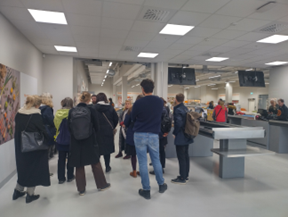
Caption: Visit to Stockholms Stadsmission
Basta! – www.basta.se
Basta is a social enterprise that is made up of many smaller workshops such as a dog hostel, a carpentry, event organizing, gardening, graffiti removal and more. At Basta they offer housing and work-training for former drug abusers allowing them to get involved in one of the workshops but also to run the enterprise itself. At the end of the training the people who themselves did their rehabilitation at Basta have the opportunity to be employed in one of the workshops. In that way everyone at Basta has influence and power over the enterprise and its development.
Because it is important that Basta is able to sell its services they need provide good quality in everything they do. This means that nothing is done without a purpose or just to pass the time. Also, given that Basta, to a great extent, is structured in a decentralized way this requires everyone running the enterprise to take on various levels of responsibility. This in turn allows individuals further personal development and increased self-esteem.
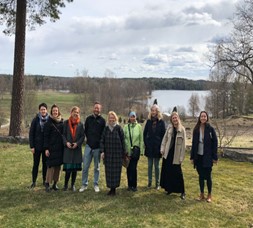
Caption: Visit to Basta!
A valuable experience for the pilot-projects
The participants learned more about cross-sectoral partnerships and self-confidence and got inspired by new concepts that they might be able to implement in their respective countries. The fact that the Learning Expeditions gave valuable experience is mirrored in the high NPS of 67%*.
“It was particularly instructive to see how social problems are solved in Sweden, even if the legislation is not done yet.”
“The learning proposition was an opportunity to make new connections, learn new concepts, hear about both successes and failures of established organizations, gain new knowledge and inspiration.”
“I realized that people are looking for and finding solutions for better life for themselves and /or others. I liked a lot both in Matmissionen shop (and information provided in the Stockholm City Mission office before that) and at BASTA, too. It was so inspiring to see the results of work done by all of the people. Well, of course, we have to remember that changes ask for time, sometimes a long time.”
Next step: online workshops
The pilot-projects attended four online workshops in June and July to work concretely and more precisely on their own upscaling projects. During these, Avise organized sessions around presentations, interventions from different experts and concrete exercises, in order for the implementors and mentors to prepare their upscaling strategy.
The four sessions approached 3 different issues:
- Social Impact Assessment: during this session, participants learned how to identify one’s social impact – in particular through the approach of the theory of change – and how to measure it.
- Upscaling Theory: the workshops presented existing upscaling strategies such as replication and fertilization and allowed the participants to consider which one they could implement. They were invited to define their vision, the reason why they are upscaling and their ambition.
- Business Model – part 1: the participants worked on their Social Business Model Canvas (SBMC) and were asked to identify the replicable elements to compose their core model. They reflected upon the Network’s Missions by defining the relationship between the parent organization and the local branches.

